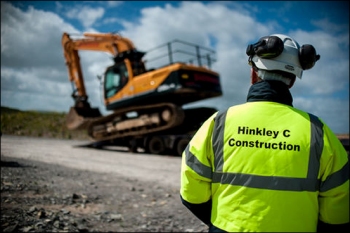Burnham-On-Sea’s MP James Heappey has explained why he believes the Prime Minister is right to have given the £18bn Hinkley Point C project the go-ahead this week.
The MP spoke out after Thursday’s announcement that Europe’s biggest construction project will go ahead with a number of security caveats to control ownership.
“I’m delighted that – with a couple of caveats – the Prime Minister has decided to give Hinkley the nod,” he says.
“The Prime Minister was absolutely right to look again at the Hinkley deal and sensible in setting the caveats she has to control ownership. However, the decision could not wait any longer.”
“Nuclear power stations are expensive things but they produce huge amounts of reliable, low carbon energy, free from the price fluctuations of the global gas market and the unreliability of the weather. For an economy the size of ours, that ‘always on’ base load is inescapably essential.”
“However, those who are saying there are other ways of generating that energy are not entirely wrong. I’m writing this from the west coast of the United States, where the Energy and Climate Change Select Committee are currently meeting with some of the policy makers and companies that are most enthusiastically embracing the renewables-plus-storage future.”
“Yesterday morning we were at Tesla, and after that we were at Nest. The vision they have is compelling, and with Elon Musk backing one and Google the other I have no doubt they’ll succeed. Yet they’ll be the first to admit that they’re only just getting going.”
 “Our current nuclear fleet generates about a third of our electricity and in around a decade’s time, we have to switch it off.”
“Our current nuclear fleet generates about a third of our electricity and in around a decade’s time, we have to switch it off.”
“No matter how successfully we encourage greater energy efficiency or the growth of demand management technologies (and we must keenly encourage both), we will still need to replace that generation’s capacity, because our wider plans for the decarbonisation of heating and transport will massively increase the electricity load placed on the UK system.”
“I have every confidence that the ministerial team at BEIS are as enthused as I am about the decentralised, digitised, and dynamic energy system of the future. And it is perfectly possible that this sort of system could be ready to act as base load by the time Hinkley gets switched on.”
“On the other hand, it might not be. The Government has to make a decision that makes sure the lights are still on in a decade’s time.”
“Moreover, we cannot be lazy and compare the cost of Hinkley to the current UK wholesale price of electricity. Nobody can build any sort of generation system for that.”
“Gas fired power station developers might currently want a strike price of around £75 per MW/hr but that is with gas prices as low as they are at the moment. It certainly wouldn’t take much of a hike in gas prices to get up to the price of Hinkley.”
“On top of that, it is important to note that replacing the current nuclear fleet with gas would run a cart and horses through our international commitment to decarbonise.”
“Our ambition should be to build this fleet of new nuclear power stations so that we continue to draw a third of our energy from that ‘always on’ base load. Beyond that we should pursue as much renewable generation as we can manage, and we should aggressively promote the UK as a place to develop storage technologies.”
“There is a huge industrial opportunity in doing so. We’ll need some combined cycle gas turbine power stations to balance out the intermittency of renewables until that storage capacity is in place but once the gas has gone, we’ll have a reliable and completely clean source of energy that can meet the growing needs of our low carbon economy.”
“We are going to switch off our coal fired power stations by the end of the decade and the current nukes must be switched off within the decade that follows. Replacement capacity that is utterly reliable must be commissioned urgently to plug the gap that will be left.”
“No matter how expensive Hinkley might seem, the cost of turning to standby generation or peaking plants when there is insufficient power to meet our needs will be significantly higher because the lights cannot be allowed to go out.”







